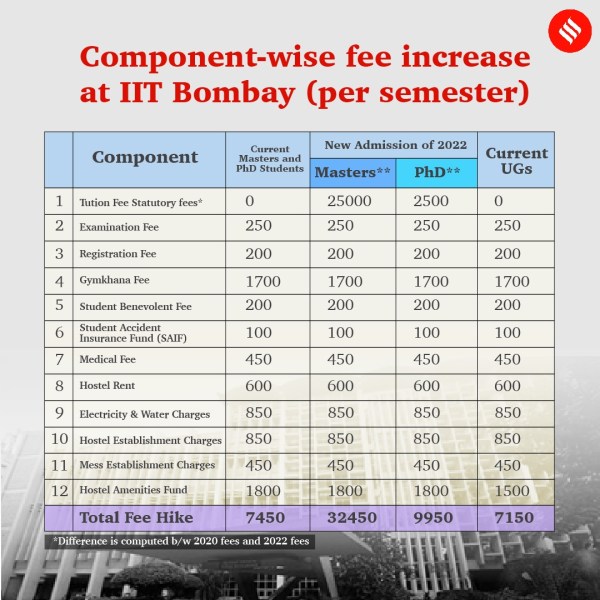Why are IIT Bombay students on a hunger strike?
Protesting against fee hike, students of the Indian Institute of Technology (IIT) in Bombay have been on a relay hunger strike since August 6. They are demanding a rollback of the increased fee, while the administration has taken a strong stand justifying the hike in a statement issued on Sunday.
An overview of the hike, its impact, and the administration’s stand:
Demands of the students
The premier institute has declared a new fee structure for the 2022-’23 autumn semester, which shows a significant hike in the total amount of the fees, particularly for the post-graduate (PG) and PhD students.
The protests first began on July 20 in the form of email, signature campaigns, subsequently moving to placards.
Students began a relay hunger strike on Saturday (August 6) and are demanding complete rollback of the fee-hike.


The fee hike
The fee hike is applicable to the undergraduate (UG), PG and PhD courses, but varies in terms of percentage of hike for each, depending on the fee structure earlier.
The last hike was in 2017, after which it was decided to review the fee-structure every three years. The board of governors at IIT Bombay — the institute’s highest decision-making body — went on to approve a 15 per cent fee hike in 2020. But it was never implemented due to the pandemic. The management also decided that it would allow an additional 5 per cent fee-hike every year there on.
Therefore, as per the administration, the total fee-hike for the 2022-’23 session would be 25 percent (15 percent, 2020 and 5 percent each for 2021 and 2022).
Impact on students
The tuition-fee component of the fee-structure of the current PhD and the PG courses remains same, but there is an increase of a combined Rs 7500 in other aspects such as hostel fee, gymkhana fee, security fee, medical fee, among others.
New admissions, though, will see a hike in tuition fee, alongside other components, with the PhD courses seeing an increase from Rs 2500 to Rs 5000 and the PG courses marking a significant climb from Rs.2500 to Rs.25000
The admission process is yet to start for the UG programmes, but according to the administration, they are not likely to see any hike in the tuition-fee component. The current undergraduate students also feel it would not have a significant impact on their total fee structure, considering the already high fee for such courses.
“The tuition fee, which is the highest component, is already around a lakh, taking their overall fee-structure way above 1 lakh. A hike of around Rs.7000 is not really a burden in comparison,” shared an undergraduate student, adding that “it will now be important to see if tuition-fee increases for new UG admissions.”
Administration’s response
The administration held open houses with students to discuss the concerns, and four members from the elected student body have been added as permanent invitees to the fee committee.
A decision was taken to reduce the hostel amenities component from the semester mess advance, as well as defer fees for students with economic difficulties, including those whose stipends are delayed by the sponsoring agencies, upon requests. Students have been allowed to pay the semester mess fee in advance and in two installments.
Additionally, the institution said it would work on scholarships for postgraduate students with financial difficulties, along the lines of the various scholarships present for undergraduate students.
Administration’s standpoint
The administration has cited a fund crunch, especially when it comes to infrastructural development.
In the official statement issued by the administration on Sunday, it said, “The bulk of IIT Bombay’s funding comes from the government, with fees being only 8% of revenue. While tuition fees can never cover our overall costs, it is the expectation that the hostel related fees will at least be comparable to the hostel related expenses incurred.”
It went on to say that it was “essential to cover actual expenses, allowing other sources of income to be used to provide better academic facilities for all our students, adding that it needs “to take the loans which the administration badly requires for expanding infrastructure, rather than subsidizing operational expenses of hostels.”
It added: “ Higher educational institutes now need to take a loan to pay the cost of all new hostel and academic building construction, which is to be repaid in 10 installments, with interest paid by the Ministry of Education. Given the sharp increase in the number of students, IITs need to build more hostels and academic buildings,” reads the statement.
A representative from the administration’s side said: “Instead of the traditional practice of the government grants for all public funded educational institutions, the IITs, like other premier educational institutes, are now expected to take loans under the Higher Education Financing Agency (HEFA), especially for infrastructural development. Under this new policy, once a loan is granted to IIT, the principal amount has to be repaid by the IIT while the ministry of education takes care of the interest”.
Why are protests happening only in IIT Bombay?
Considering that the changes in funding practices are applicable to all premier educational institutions, many ask why there is a protest only in IIT Bombay.
As per the administration, “most other IITs already have higher fee-structures”.
“In fact, in some cases, such as IIT Madras, there is no accommodation facility for all. A student has liberty to stay outside of campus and that is a feasible option too, considering low rent-amounts. That is not an option here in Mumbai,” an administrative official said.
They added that the prices in the area, consequently, have an impact on “the cost of development projects too”, which is on a higher side.



